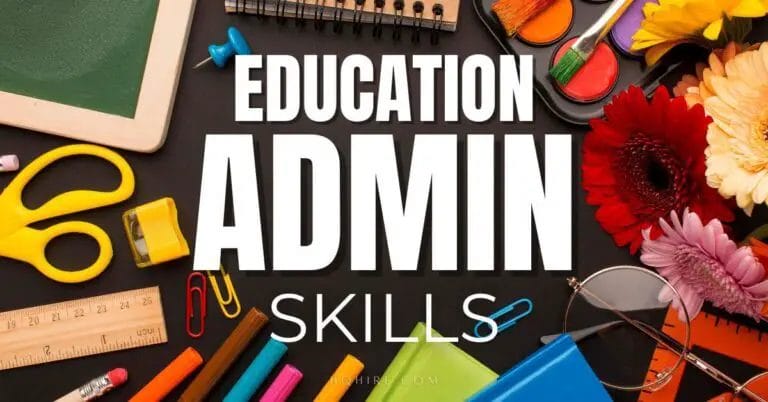|
Listen To Article
Getting your Trinity Audio player ready...
|
Becoming a preschool teacher is a fulfilling and impactful career choice, as it involves nurturing and shaping the minds of young children during their critical developmental years. To excel in this role, it is essential to possess a diverse set of skills that contribute to creating a positive learning environment and fostering children’s growth.
This article will explore the key skills required to become a successful preschool teacher, including the duties and responsibilities, characteristics, personality traits, and specific skills that play a vital role in this rewarding career.
Duties and Responsibilities of a Preschool Teacher
- Creating and implementing age-appropriate lesson plans: This skill enables effective curriculum delivery and engages children in meaningful learning experiences.
- Facilitating learning through play and hands-on activities: By incorporating play-based learning, teachers can promote children’s cognitive, social, and emotional development.
- Promoting social, emotional, and cognitive development: Preschool teachers guide children in developing crucial skills such as empathy, self-regulation, problem-solving, and early literacy and numeracy skills.
- Providing a safe and nurturing environment for children: Creating a secure and inclusive classroom environment fosters children’s sense of belonging, encouraging optimal learning and growth.
- Collaborating with parents and colleagues: Building strong partnerships with parents and collaborating with fellow educators enhances the support system for children’s holistic development.
Characteristics of a Successful Preschool Teacher
- Patience and understanding: A patient and empathetic nature allows teachers to meet the diverse needs of young children and support their individual growth.
- Creativity: Having a creative approach to designing engaging activities and lessons encourages children’s curiosity, imagination, and problem-solving abilities.
- Adaptability: Being adaptable enables teachers to respond to the ever-changing needs and dynamics of the classroom, ensuring effective teaching and learning.
- Excellent communication and listening skills: Clear and effective communication, along with active listening, promotes strong connections with children, parents, and colleagues, enhancing collaboration and understanding.
- Empathy and relationship-building: Building positive relationships with children and their families creates a nurturing and supportive environment that fosters growth and learning.
Personality Traits Needed for a Preschool Teacher
- Warmth and nurturing nature: A caring and nurturing demeanor helps create a safe and welcoming atmosphere, promoting children’s emotional well-being and sense of security.
- Enthusiasm for early childhood education: Having a genuine passion for working with young children and fostering their development creates an engaging and positive learning environment.
- Organizational skills: Strong organizational abilities enable teachers to manage classroom routines, materials, and resources effectively, optimizing teaching and learning experiences.
- Flexibility: Being flexible and adaptable allows teachers to accommodate individual needs, address unexpected situations, and facilitate optimal learning experiences for all children.
- Teamwork and collaboration: Collaborating with colleagues, parents, and other professionals fosters a holistic approach to education and strengthens the support system for children.
Interpersonal Skills of a Preschool Teacher
- Active listening and effective communication: Listening attentively and communicating clearly with children and parents promotes understanding, trust, and positive relationships.
- Conflict resolution and problem-solving: The ability to mediate conflicts and solve problems in a classroom setting promotes a harmonious and conducive learning environment.
- Collaboration with colleagues and parents: Working collaboratively with colleagues and involving parents in their child’s learning journey fosters a comprehensive and supportive educational experience.
Teaching Skills of a Preschool Teacher
- Curriculum planning and lesson preparation: Skillful planning and preparation ensure the delivery of developmentally appropriate and engaging lessons aligned with learning objectives.
- Instructional strategies: Employing effective teaching strategies, such as play-based learning, scaffolding, and differentiated instruction, enhances children’s engagement and understanding.
- Classroom management techniques: Implementing positive behavior management strategies and establishing clear expectations create a structured and focused learning environment.
Observation and Assessment Skills of a Preschool Teacher
- Ability to observe and evaluate children’s progress: Careful observation enables teachers to assess children’s development, identify strengths and areas for improvement, and tailor instruction accordingly.
- Documentation and record-keeping: Accurate and organized documentation allows for comprehensive tracking of each child’s progress and facilitates effective communication with parents.
- Application of appropriate assessment methods: Utilizing various assessment tools and techniques, such as observations, portfolios, and checklists, helps evaluate children’s learning outcomes and inform instructional planning.
What Does It Mean To Be a Preschool Teacher and an Early Childhood Educator
Becoming a successful preschool teacher requires a combination of duties, characteristics, personality traits, and skills that contribute to creating a nurturing and stimulating learning environment.
By acquiring and honing these essential skills, educators can make a profound impact on children’s early development, setting them on a path towards lifelong learning and success.
Embracing the duties and responsibilities, embodying the desired characteristics, and developing the necessary skills will empower individuals to excel in the rewarding field of early childhood education.
Job Description Example
Preschool Teacher Job Description
We are seeking a compassionate and dedicated Preschool Teacher to join our team. As a Preschool Teacher, you will play a vital role in fostering the intellectual, emotional, and social development of young children.
Your expertise in early childhood education and your nurturing approach will create a positive and engaging learning environment for our preschool students. If you have a passion for working with young children, excellent communication skills, and a creative teaching style, we invite you to apply and be part of our team of educators.
Responsibilities
- Develop and implement age-appropriate lesson plans and educational activities to stimulate children’s learning and development.
- Provide a nurturing and supportive environment where children feel safe, encouraged, and motivated to explore and learn.
- Teach basic skills, such as language, mathematics, science, and social skills, through creative and interactive teaching methods.
- Observe and assess children’s progress, documenting their achievements, and providing regular feedback to parents or guardians.
- Create a structured daily routine that includes playtime, rest time, snack time, and learning activities.
- Foster a positive classroom atmosphere, promoting inclusivity, respect, and cooperation among students.
- Collaborate with parents or guardians, keeping them informed about their child’s progress, behavior, and any concerns or achievements.
- Maintain a clean and organized classroom, ensuring a safe and hygienic learning environment.
- Incorporate age-appropriate educational materials, books, toys, and technology to enhance learning experiences.
- Stay updated with current trends, research, and best practices in early childhood education.
Key Requirements
- Degree in Early Childhood Education or a related field, or relevant teaching certification.
- Proven experience working with preschool-aged children, demonstrating a thorough understanding of their developmental needs.
- Knowledge of child psychology and early childhood teaching methods.
- Excellent communication and interpersonal skills to effectively interact with children, parents, and colleagues.
- Patience, empathy, and a genuine love for working with young children.
- Creativity and the ability to design engaging and interactive learning activities.
- Strong organizational and time management skills to plan lessons and manage classroom activities effectively.
- Familiarity with child safety and first-aid procedures.
- Ability to work collaboratively in a team environment.
- Clear background check and any other requirements mandated by local licensing regulations for working with children.
We’ve one question…
Did we miss out on any critical skills needed?
Let us know in the comments below!
Education is probably the most important field for nurturing our next generation. While there are many types of educator, preschool teachers plays a critical role in early development for young children.
And also… come take a look at other types of career paths and learn more about it as well!
Read Also:
- 20 Online Meeting Etiquette in The Workplace (Remote Work)
- How to Host Effective Online Meeting (Beginner’s Guide)
- Online Meetings in the Workplace (Complete Guide)
- +15 Best Webinar Software for Business and Workplace (Live & Automated)
- Best Practices For Confirming a Meeting
Join over 11,000+ achievers who are committed to achieving their career goals!






